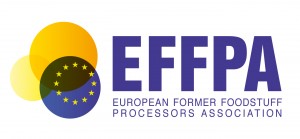EFFPA, the European Former Foodstuff Processors Association, warmly welcomes the Farm to Fork Strategy published by the European Commission on 20 May 2020. Former foodstuff processing corresponds well with a range of the projected ambitions as regards sustainable food production systems, such as reduced environmental and climate footprint of the EU food system, increased circular business models, reduced food waste and the recovery of secondary raw materials.
Former foodstuffs are well-suited to contribute to a reduced environmental and climate footprint of animal products, as their use in feed compared to nutritionally equivalent, “traditional” feed materials has lower environmental impacts, particularly in terms of land use and overall carbon footprint. EFFPA members are starting to engage on the development of data linked to the environmental performance of processed former foodstuffs in feed. EFFPA expects that this will be a key contribution of the sector to a more sustainable animal production chain.
Former foodstuff processing, i.e. the conversion of ‘ex-food’ at food manufacturing level that are no longer intended for human consumption into feed, is in essence a circular ‘food-feed-food’ business model that simultaneously reduces food waste and assures the safe use of “secondary raw materials” in feed. EFFPA calls on the European Commission to facilitate the food-to-feed transition to allow usage of surplus food for animal feed when it is not possible to redistribute it to humans, in line with the Recommendations for Action in Food Waste Prevention developed by the EU Platform on Food Losses and Food Waste.

